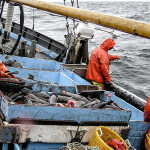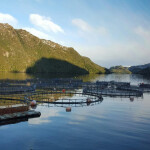Canadian fisheries scientists are criticizing the conclusions of a study that predicted wild pink salmon runs in British Columbia could be driven to extinction by sea lice infestation caused by nearby fish farms.
The Pacific Salmon Forum, which is funded by the provincial government, will host a Feb. 7 meeting of the Science Advisory Committee to discuss the study's findings. The lead author of the report, University of Alberta graduate student Martin Krkosek, and his research team will make a presentation on their study and answer questions, according to a Jan. 23 report in The Globe and Mail, Canada's largest newspaper.
The forum's own research doesn't support Krkosek's theory, said Chairman John Fraser, who disassociated the forum from the controversial study that was published in the December issue of Science magazine.
''[Mr. Krkosek's] work is all based on assumptions for which there are good reasons to invalidate, and which they have never documented,'' said Kenneth Brooks, a marine researcher who co-authored a critical letter to Science that was signed by 20 fisheries biologists. ''He has been asked repeatedly: Do you have any data substantiating cause and effect with salmon farms and sea lice? The answer is always no.''
Brian Riddell, Pacific division manager for Canada's Department of Fisheries and Oceans, said the evidence in the study does not support the conclusions.
''That's what a peer review should have picked up,'' he said. ''But it did not, and so now we're the black horse. The bottom line to me is, if anyone actually understands the trends of the pink returns in the Broughton [Archipelago], they are inconsistent with a rapid decline to extinction.''





